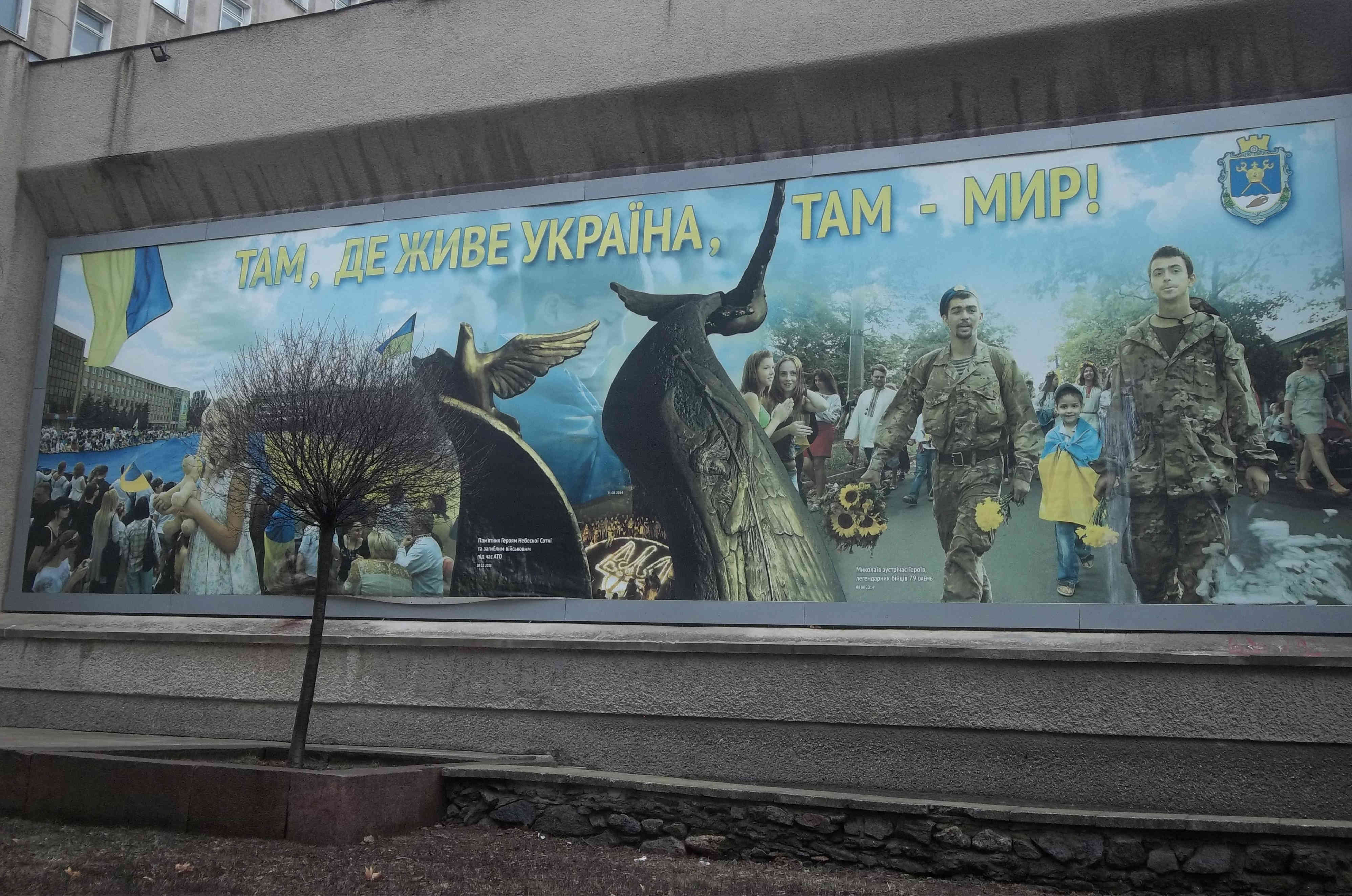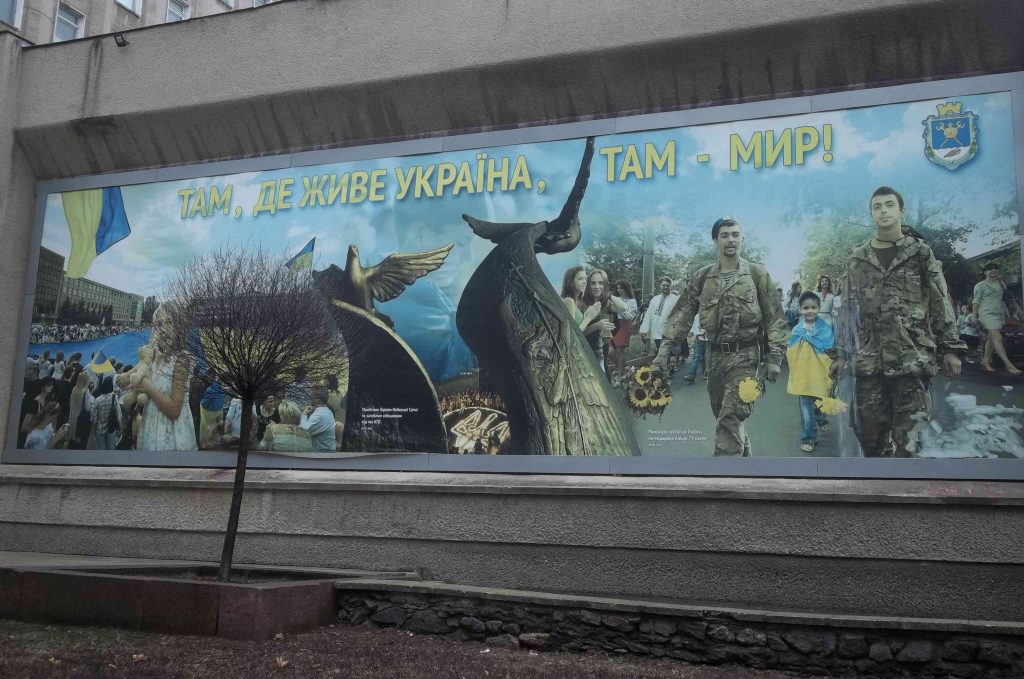 As rain clouds sweep in from the west on a winter morning, the Ukrainian Black Sea town of Mykolayiv does not present the most welcoming picture. Up to three feet of standing water obscure the city’s main intersections, where stray dogs and homeless people rush to traverse four lanes of traffic before the next taxi driver hydroplanes through. Local newspapers are filled with advertisements touting the “dignified, legal pay” of $60 per month for janitorial work, or seeking “women 18-35” who can earn $120 per month as “online chat hostesses, English language skills preferred.”
As rain clouds sweep in from the west on a winter morning, the Ukrainian Black Sea town of Mykolayiv does not present the most welcoming picture. Up to three feet of standing water obscure the city’s main intersections, where stray dogs and homeless people rush to traverse four lanes of traffic before the next taxi driver hydroplanes through. Local newspapers are filled with advertisements touting the “dignified, legal pay” of $60 per month for janitorial work, or seeking “women 18-35” who can earn $120 per month as “online chat hostesses, English language skills preferred.”
Given the city’s economic struggles, it is perhaps not surprising that 33-year-old IT-sector entrepreneur Alexander Senkevich attracted an unprecedented outpouring of volunteer enthusiasm this past October with a successful mayoral campaign built on promises of economic and political reform. Indeed, as Oleksandr Ukhmanovskyi, Mykolayiv’s director of the Committee of Voters of Ukraine, told me, Senkevich became “the hope, even the love interest” of young people frustrated with a system ruled by “bandits” and highly dependent on industries like shipbuilding that have fallen on hard times. “For the first time in their lives,” Ukhmanovskyi added, “the volunteers felt in their bones that positive changes would happen.”
Unfortunately, those positive changes aren’t taking place fast enough. “Even though I was very happy when he won…there [has not been] much progress,” said Mykhaylo Zolotukhin, director of the Development Fund for the City of Mykolayiv (DFCM), an independent watchdog NGO. “His new advisers are not familiar with public procurement procedures and the selection criteria for new city department heads are simply not transparent,” he added, concluding that “our hope is now decreasing that these reforms will ever be implemented.”
Indeed, as Ukhmanovskyi put it, “For many volunteers, love has now turned to heartbreak,” calling into question whether the “Senkevich phenomenon” described by Ukrainian journalists exists anymore.
When confronted with such criticism in his city hall office, the affable Senkevich smiled and said, “Of course some activists are disappointed, but you can’t build new roads in just a few weeks! We’re doing things step by step here.”
One obstacle, he acknowledged, is the difficulty of attracting high-quality staff to city government. Ideally, civil service salaries should be raised, because “people have to have motivation. If someone works well but is paid poorly, then performance suffers.” Nonetheless, for Senkevich, who regularly referred to the oath of office prominently displayed over his desk, government service is not a job “where people will make lots of money” (the mayor himself earns just over $250 per month) “but a calling and a mission” that he believes qualified people are willing to fulfill.
One key challenge is all the more remarkable for not being raised by the mayor or anyone else in Mykolayiv: the threat posed by separatism along the lines of Crimea, or of Luhansk and Donetsk to the east. Certainly, there have been tensions in the past—as evidenced by the occasional Ukrainian flag mural defaced by SS runes, echoing the accusations of “fascism” leveled by Moscow against Kyiv. But a survey of graffiti reveals a predominantly pro-Ukrainian bent, with even the single “Mykolayiv is Russia” slogan spotted by the author replaced overnight.
This lack of separatist sentiment in the city is perhaps not from a lack of effort. After all, Alexander Zakharchenko, the leader of the so-called Donetsk People’s Republic, endorsed Senkevich’s second-round electoral opponent, Ihor Dyatlov of the Opposition Bloc, something Ukhmanovskyi described as a “gift” to the Senkevich campaign. While Zolotukhina warned that there is a risk of separatism if reforms are not implemented quickly, for his part Senkevich has pointed to the fact of his election as proof that separatist sentiment among the population is small and “not worth paying attention to.”
It is still true that one rarely hears Ukrainian in Mykolayiv, despite its use on all official signage in the city. Even though many residents speak it fluently, the language divide became an issue in Senkevich’s campaign because of his affiliation with the Samopomich Party, which has its main support base in Lviv, the intellectual and cultural center of the Ukrainian-speaking west of the country.
Asked why he would leave himself open to charges of being a Ukrainian-language chauvinist and “Lviv import” (despite being born and raised in Mykolayiv) by associating himself with a party that had previously enjoyed little support in the city, the mayor responded by first pointing to the energetic support of the party’s volunteers, adding, “I wanted to choose something that hadn’t been associated with corruption or the problems of the past—and that had principles and ideas I could support.”
Indeed, as a Lviv-based analyst told me, thanks to the reforms he proposed and implemented, three-term mayor and Samopomich head Andriy Sadoviy “created a great image of Lviv that has attracted people all over the country,” an image the source described as a “brand that is now synonymous with the idea that you can live in Ukraine like they do in Europe—with a government that works.”
As the morning rainstorms fade and the sun peeks through the clouds, a different face of Mykolayiv emerges. Just like in Kyiv, Lviv, and other major cities, a newly-trained police force wearing American-style uniforms patrols the city, striding with a sense of purpose totally unlike the bribe-seeking shuffling of the previous militsiya—but similar to that exhibited by representatives of the huge military presence in and around the city that some residents credit with “saving” them from the fate of Crimea, a mere two hours’ drive away.
Near city hall, a large mural declares, “Wherever Ukraine lives, peace prevails.” While world peace might be too tall of an order from local government, if the people of Mykolayiv can live in a city with reliably paved roads, working public transport, and effective animal control services, the “Senkevich phenomenon” might have something to it after all.
Emmet Tuohy is senior research fellow at the Estonian Center for Eastern Partnership.
Image: Near city hall in Mykolayiv, Ukraine, a large mural declares, “Wherever Ukraine lives, peace prevails.” Credit: Emmet Tuohy
